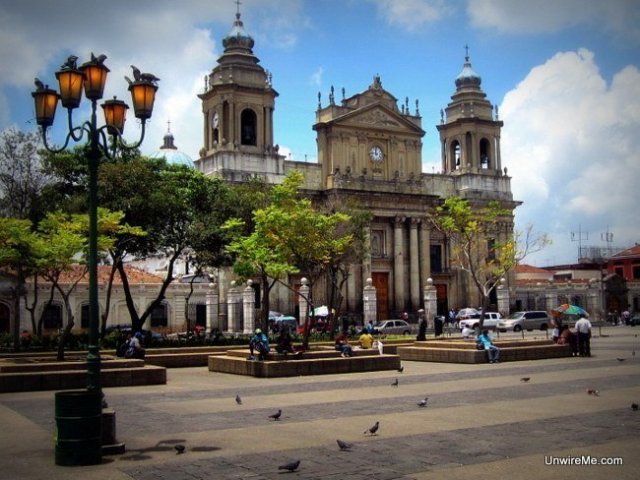For part one of my visit to Guatemala City’s historic downtown, click here. Besides Plaza Mayor’s imposing green building, known as The Big Guacamole, there is another structure that catches everyone’s attention.
Metropolitan Cathedral
The Catedral Metropolitana (Metropolitan Cathedral), has been a fixture at the plaza for a long time, having been built between 1782 and 1815. Well, the main building at least, since the towers flanking each side were finished in 1867.

Guatemala City’s Catedral Metropolitana (Metropolitan Cathedral)
Here, I’m supposed to tell you that the Cathedral was built in a Neoclassical style. What that means is that it’s not as fancy and ornate as earlier buildings (Baroque), but a simpler, more classical style. One of the reasons why this cathedral doesn’t rate as highly in the “looks” department as other ones.
The cathedral was damaged in 1917 when the city was hit by 127 (not a typo) tremors in the span of fewer than 24 hours. The temple was reconstructed and reinforced in the following years. Good thing too, as another huge earthquake struck the city in 1976, which damaged it severely. It would’ve been reduced to rubble if it hadn’t been reinforced.
There are 12 pillars in front of the church (8 visible below), which have inscribed on them the names of hundreds of people that had “disappeared” or had been murdered during Guatemala’s recent and bloody civil war.

Facade of the Metropolitan Cathedral in Guatemala City

Monument to genocide victims in Guatemala’s Civil War
The Pope has visited the cathedral twice.

“Holy Door” – Not the size, I mean what the inscription on the door says.

View of Guatemala’s central plaza from the Cathedral
The interior is somewhat elementary, but it goes with the style in which it was built.

Inside the Metropolitan Cathedral in Guatemala City

Holy altar at the Metropolitan Cathedral
The picture below almost got me in trouble with one old church lady. It turns out you can take pictures of anything you want in the church, but not this particular sanctuary.
“Why?”, I asked the lady.
“Because Jesus is there,” she answered.
I looked again but didn’t understand which “Jesus” she was referring to. If anything, there was a pretty big cross with Jesus’ image, located on the main altar. Nobody had a problem when I took a picture of that. Maybe she meant the Archbishop or another religious figure?
“Which Jesus…?”
“God… Jesus. And He doesn’t like pictures,” she answered back. I promise you this is what she said.
A five-minute theological “discussion” ensued, in which she pretty condescendingly explained to me that Jesus’ body was there, within the Eucharist trays that were placed in front of the sanctuary. There was no way I was going to:
a) Argue with an old church lady and b) in her house of worship.
So I politely thanked her, stopped taking pictures, and moved on to the other attraction outside, Sexta Avenida (Sixth Avenue).

Transept at Catedral Metropolitana, Guatemala City
Sexta Avenida Guatemala
As my family and I made our way to Sexta Avenida, a commercial street closed-off to vehicular traffic, I encountered a game going on, involving rods and who could grab on to them the longest. No way I’m making jokes about that… you’re on your own there.
These gatherings are opportunities for pickpockets to work their craft, so I quickly moved on.

Street performers at Sexta Avenida in Guatemala City
Sexta Avenida is one of the oldest and arguably the most important street, historically, in Guatemala. It used to be known by the name of Calle Real (Royal Street). It was the first street to get candle-lights in its corners, switched later to petroleum, gaslights came later, and finally electric lights.
In 1877, all roads were changed over to numeric designations, which is how SixthAvenue came to be known by its current name. In fact, the street became such a hub for activity and commerce, which strolling around Sexta became a verb, “sextear” and “sexteando.” Which awkwardly can be translated as “sexting“.
Trees and striking sculptures dot the landscape along the avenue.

Entrance to Sexta Avenida

Sculptures in Guatemala City

More sculptures

Pasaje Rubio, Guatemala City
Hotel Pan American, below, was once one of the most famous in Guatemala, back when it was known by the name Hotel Astoria (no relation to the hotel in New York). It is here where visiting dignitaries stayed and where special functions were held. It had the advantage of being very close to the National Palace and offered a great view of Plaza Mayor. It still operates to this day. A cafe occupies the first floor.

Hotel Panamerican (formerly Hotel Astoria)
Another landmark that stands out is Cine Lux, a movie theater built in the 1930s. One of the few that survived the 1976 earthquake.
It was remodeled last year and is now a very happening cultural center.

Cine Lux – Sexta Avenida, Guatemala City
Restoration is still ongoing, and not all buildings have recaptured their former glory.

Old buildings in Sexta Avenida

Sexta Avenida on a bright day

Engel Building, Guatemala City
You can spot all kinds of performers on Sexta. Sometimes you might find a ninja (or is it a mummy???)

Mummy, Guatemala City
You might run into Captain Jack Sparrow too.

Jack Sparrow in Guatemala City
Church of San Francisco is also on Sexta Avenida. Closed to the public that day, unfortunately.

Church, Guatemala City – Iglesia San Francisco
Right next to the church is the National Police Palace, an attractive building with Moorish touches. San Francisco Church can be seen in the background.

National Police Palace, Guatemala City
And so concludes a VERY brief tour of historical Sexta Avenida. We barely walked half of it and didn’t even get the chance to visit some interesting museums and other sights around the area.
♦♦♦♦♦♦
Have you visited Sexta Avenida?
What did I miss?


Interesting place (:
Yes it is! I’m having fun exploring all the little-known places.
-Rich